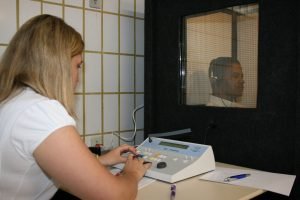This post may contain Amazon® product affiliate links. We may receive a commision if you make a purchase after clicking on one of these links but at no cost to you. Please visit Our Disclosure Page for more information. Thank you.
 Often, tinnitus is a symptom of an underlying problem. Because of this, the first thing you should do to stop your ears from ringing is to try and determine the underlying cause by seeking medical attention as soon as possible.
Often, tinnitus is a symptom of an underlying problem. Because of this, the first thing you should do to stop your ears from ringing is to try and determine the underlying cause by seeking medical attention as soon as possible.
You should make an appointment for a medical exam, with special attention paid to checking out the factors that are associated with this specific condition. A hearing evaluation can help to identify hearing loss that may be linked to tinnitus. Tinnitus can also be linked with certain health issues that affect different levels of the auditory system. Some of these conditions include ear infections, impacted earwax, otosclerosis, tumors located in the middle ear and noise-induced hearing loss, Meniere’s disease and vascular problems.
Why you need an Evaluation
A person’s hearing will need to be evaluated by an audiologist in order to determine if there is any hearing loss present. Because tinnitus can be linked to a number of auditory conditions, an evaluation can provide an extensive amount of information regarding the underlying cause and the options available for treatment.
The most effective treatment for ringing ears is the elimination of the underlying cause. Because ringing in the ears can be a symptom of a treatable medical condition, surgical or medical treatment can correct the tinnitus. Unfortunately, in several cases the cause of tinnitus can’t be indentified so surgical or medical treatment is not an option. In cases such as these the tinnitus itself will need to be treated. You’ll need to discuss the treatment options with your physician and determine which types of treatment your insurance will cover.
The forms of tinnitus management include hypnosis, biofeedback, relaxation therapy, counseling, electrical stimulation, tinnitus maskers and habituation therapies.
If the audiologist determines that you have experienced some hearing loss then there is a good chance that a hearing aid can not only help to improve your hearing but it will also relieve the symptoms associated with tinnitus. The audiologist will assist you with selecting the right hearing device and help to train you on how to use the aid effectively.
Extra Support for Tinnitus Sufferers
 A tinnitus masker looks like a hearing aid and it produces sounds that will cover up the ringing in the ears caused by tinnitus. The masking sounds will work to distract the user and can help to make tinnitus more tolerable. The characteristics of tinnitus as described by the patient will help the audiologist to determine what type of masking noise can provide relief. If a patient has hearing loss in addition to tinnitus, a hearing aid and masker can operate together as one instrument. Like most treatments for tinnitus, a masker can work for some patients, but not all.
A tinnitus masker looks like a hearing aid and it produces sounds that will cover up the ringing in the ears caused by tinnitus. The masking sounds will work to distract the user and can help to make tinnitus more tolerable. The characteristics of tinnitus as described by the patient will help the audiologist to determine what type of masking noise can provide relief. If a patient has hearing loss in addition to tinnitus, a hearing aid and masker can operate together as one instrument. Like most treatments for tinnitus, a masker can work for some patients, but not all.
A sound machine that provides steady background noise can be useful during the night or in a quiet environment. Low volume music, fans, fish tanks, indoor waterfalls and even a static radio station can also be helpful.
For many people, this condition can be debilitating and difficult to cope with. Self-help groups are available in many communities and are designed to provide support and information to chronic tinnitus sufferers.
